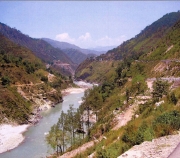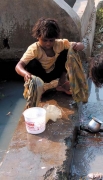Ecology and Environment
Assessment of the status of environment and forest clearances of hydropower projects on river Mandakini – A report by MoEF
Posted on 27 Dec, 2010 02:08 PM This report by MoEF regarding the environmental impact of Phata-Byung & Singoli-Bhatwari hydro power projects on the river Mandakini deals with the additional safeguards and proper monitoring & supervision to help protect the environment in these project areas. It says that since a fairly large portion of the works has been taken up it may not be worth to abandon the project. It has proposed certain remedial measures to mitigate the damage if caused to the environment and local villagers.
This report by MoEF regarding the environmental impact of Phata-Byung & Singoli-Bhatwari hydro power projects on the river Mandakini deals with the additional safeguards and proper monitoring & supervision to help protect the environment in these project areas. It says that since a fairly large portion of the works has been taken up it may not be worth to abandon the project. It has proposed certain remedial measures to mitigate the damage if caused to the environment and local villagers.
The Phata-Byung and Singoli-Bhatwari hydro power projects, are Run of the River (RoR) projects on the river Mandakini. The series of RoR projects proposed and under construction as a part of cascade development are to generate electrical energy which is considered to be clean power as it is non-polluting and renewable in nature.
Water management lessons from the Nandi foothills - SRI technique involves less water
Posted on 27 Dec, 2010 11:10 AM This has resulted in a depletion of groundwater resources. There is a scarcity of drinking water too, in the region.
This has resulted in a depletion of groundwater resources. There is a scarcity of drinking water too, in the region.
Save Western Ghats, Alva Group of Institutions, Karnataka
Posted on 27 Dec, 2010 11:09 AM Organizer: Alva Group of Institutions
Organizer: Alva Group of Institutions
Venue: Alva’s Health Center, Mijar, Moodabidri, Karnataka
Description:
On behest of the movement, of which you have been an integral part, the Ministry of Environment & Forests had set-up a Western Ghats Ecology Expert Panel to pave way for setting up the Western Ghats Environment Authority. The panel has been engaged in public consultations over past couple of months giving us a chance to collectively review its functioning as well.
Preparation of strategic plan for rural drinking water sector in India – A draft discussion paper by the Department of Drinking Water Supply
Posted on 26 Dec, 2010 07:27 AMThis draft discussion paper by the Department of Drinking Water Supply (Ministry of Rural Development) deals with the preparation of strategic plan for rural drinking water sector in India. The Government of India introduced the Accelerated Rural Water Supply Programme (ARWSP) in 1972–73 to support States and UTs with financial and technical assistance to implement drinking water supply schemes in order to accelerate the pace of coverage across rural India.
Rainfed areas and rice farming Crucial agricultural water issues
Posted on 25 Dec, 2010 08:30 PMJohn Thompson works on power, policy and sustainability issues in food and agriculture, water resource management and rural development. He is a STEPS Centre member, IDS Fellow and joint Co-ordinator of the Future Agricultures Consortium. He presents two crucial agricultural water issues to take priority on World Water Day.
Cancun: Is it a climate meet with a difference?
Posted on 25 Dec, 2010 07:58 PMDespite the pre-Cancun Wikileaks revelation of U.S. strong-arm tactics at the Copenhagen summit, and U.S. climate envoy Todd Stern's remarks about "climate bribery", wherein he said countries asking for aid were in no position to accuse the U.S. of bribery; it is largely perceived that the Cancun Climate Meet has picked up the lost momentum of Copenhagen.
193 nations met at Cancun to debate on how to move forward on the climate change adaptation process and drafted the Cancun Agreement.
Saving rice - Ambitious plans to increase productivity
Posted on 24 Dec, 2010 10:13 AMEnormous funds are being poured into research aimed at improving seed varieties, with a heavy focus on developing hybrid rice. Is it the right option for millions of small rice farmers who are already battling high input costs and increasingly unpredictable weather? Or does part of the solution lie in efficient methods of cultivation that will cut down water use and improve yield?
Rice intensification for increasing productivity in Koraput, Odisha
Posted on 24 Dec, 2010 10:12 AM
Photo: Muralidhar Adhikari
The economic impacts of inadequate sanitation in India: Rs. 2.4 Trillion equivalent of 6.4 per cent of GDP – A report by WSP
Posted on 24 Dec, 2010 09:27 AM This study report by the Water and Sanitation Programme (WSP), a global partnership administered by the World Bank suggests that inadequate sanitation causes India considerable economic losses, equivalent to 6.4 per cent of India's GDP in 2006 at Rs. 2.4 Trillion. It analyzed the evidence on the adverse economic impacts of inadequate sanitation, which include costs associated with death and disease, accessing and treating water, and losses in education, productivity, time, and tourism. The findings are based on 2006 figures, although a similar magnitude of losses is likely in later years.
This study report by the Water and Sanitation Programme (WSP), a global partnership administered by the World Bank suggests that inadequate sanitation causes India considerable economic losses, equivalent to 6.4 per cent of India's GDP in 2006 at Rs. 2.4 Trillion. It analyzed the evidence on the adverse economic impacts of inadequate sanitation, which include costs associated with death and disease, accessing and treating water, and losses in education, productivity, time, and tourism. The findings are based on 2006 figures, although a similar magnitude of losses is likely in later years.
The study focused on the safe management of human excreta and associated hygiene behavior. The methodology adopted by the study included disaggregating the economic impacts of inadequate sanitation into health-related impacts including premature deaths, costs of treating diseases, and productive time lost due to illnesses; domestic water-related impacts including household treatment of water, and money and time costs to obtain safe water; welfare losses including additional time spent by people for accessing toilets or open defecation sites, and girls having to miss school, and women not going to work; and the loss of potential tourism owing to inadequate sanitation.
Data on incidence (e.g. diarrheal diseases, deaths, etc.) were compiled from national sources (National Family Health Survey, WHO Demographic and Health Surveys, and other Govt. of India sources). Based on scientific literature, attribution factors were used to estimate the populations impacted by inadequate sanitation. Economic valuation was carried out using costs/prices based on secondary studies.
"Jungle Trees of Central India" - A preview of the field guide for tree-spotters by Pradip Krishen
Posted on 23 Dec, 2010 01:26 AM
Content Courtesy: Flowers of India
Jungle Trees of Central India is a lovingly detailed field guide to every tree you're likely to see in the magnificent dry, deciduous forests of the region. Bigger than France and encompassing 5 of India's most visited Tiger Reserves, Central India is home to the classical types of wilderness that one associates with the term 'Indian Jungle'.




